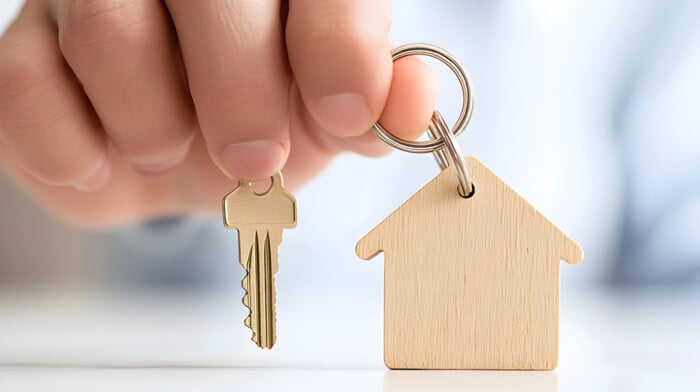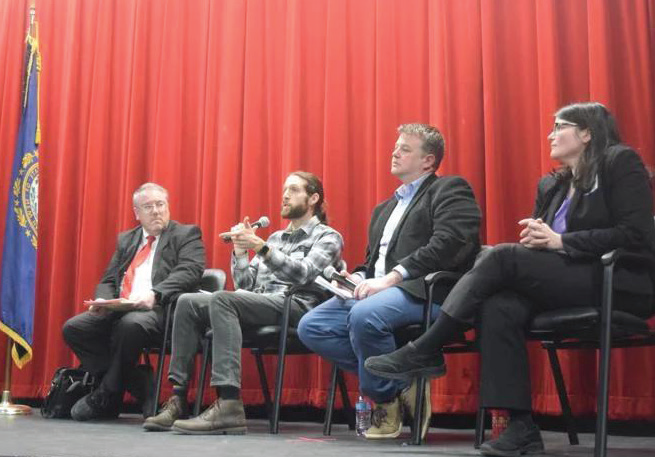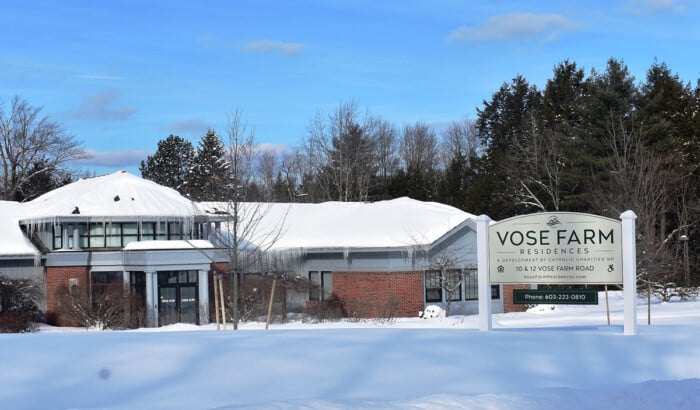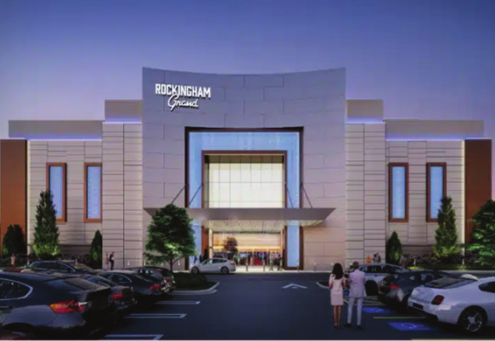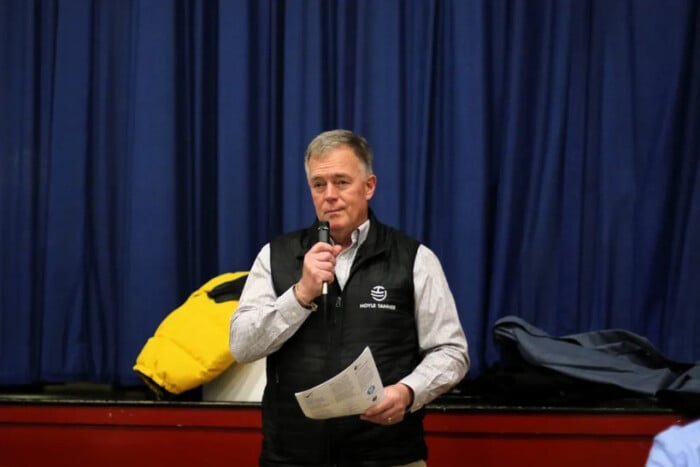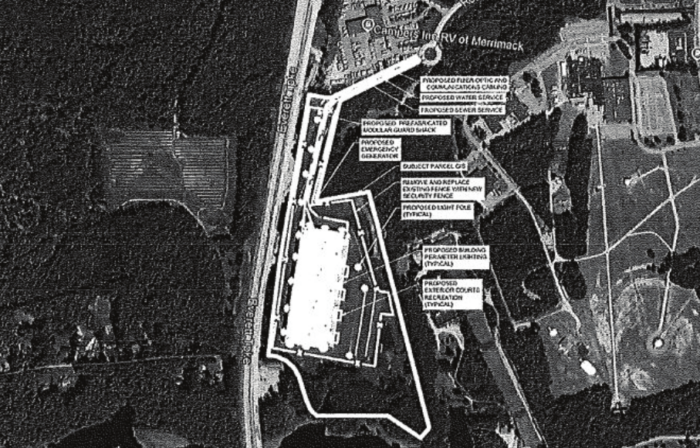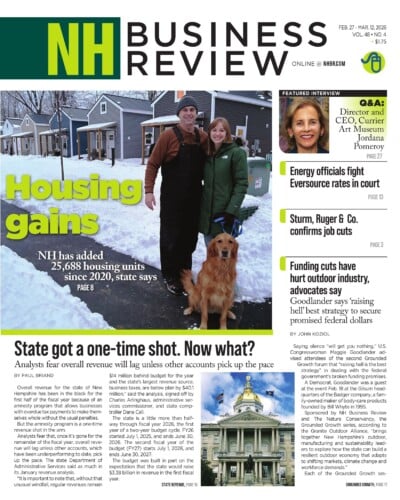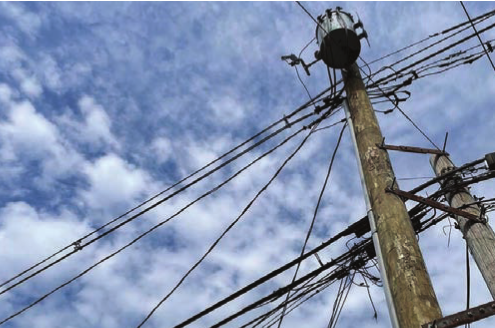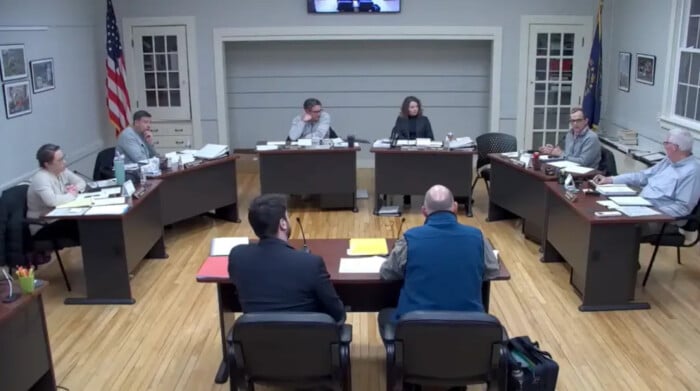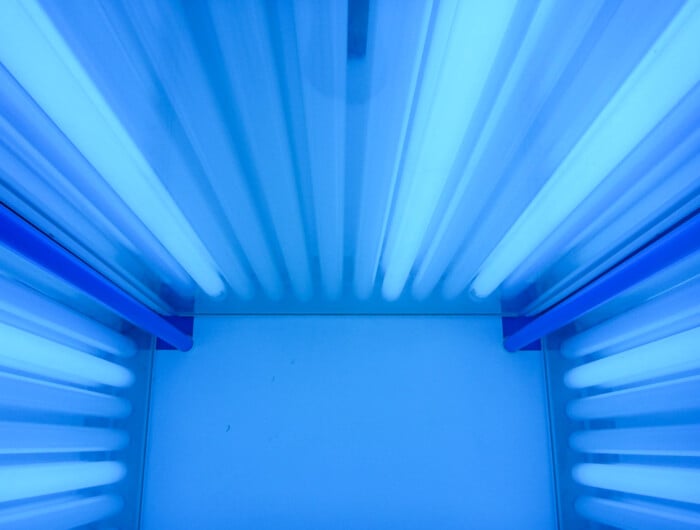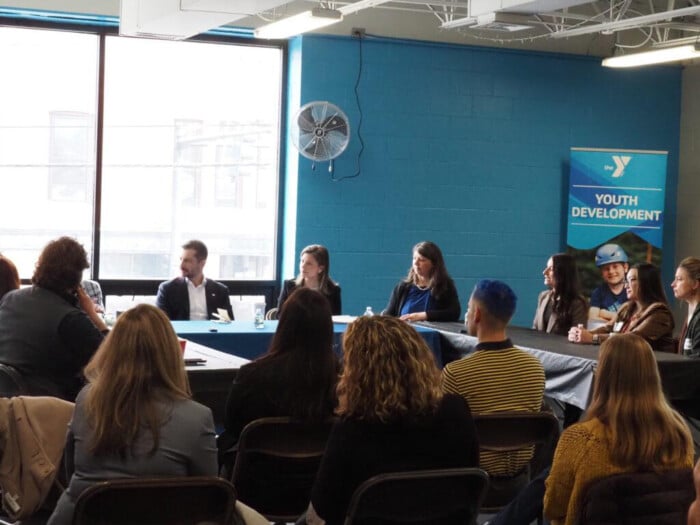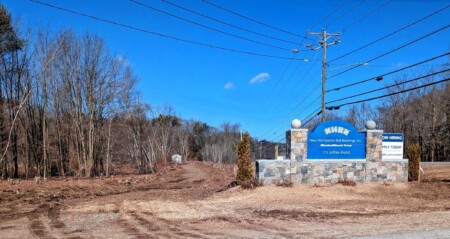
Work in front of the New Hampshire Ball Bearings property in Peterborough. (Courtesy photo)
New Hampshire Ball Bearings construction project on schedule
Two months after installation of a new permeable reactive barrier (PRB) wall at the Peterborough South Municipal Water Supply Well Superfund site began, New Hampshire Ball Bearings (NHBB) Marketing Manager Robyn Nattila said the project is on schedule for its expected completion in October.
Peterborough’s South Municipal Water Supply Well was installed in 1952, and the NHBB facility opened just over 1,000 feet away in 1957. In 1982, the New Hampshire Department of Environmental Services (NHDES) determined the well was contaminated with volatile organic compounds. Investigations by NHBB and the state determined that NHBB was the source of the contamination. In 1984, the area was designated as a Superfund site by the EPA. Since then, NHBB has cooperated with the EPA and NHDES to help remediate the issue. Installing a new PRB, which will help clean contaminated groundwater as it flows through the barrier wall and away from the NHBB facility. is the most-recent project in the ongoing cleanup effort.
“The PRB is an example of technologies that NHBB has invested in toward the ultimate goal of reopening the South Well,” Nattila said, but added that decisions regarding the use of the South Well as a water supply for Peterborough will come after an evaluation from the state and the EPA.
A PRB is a vertical structure, installed underground in locations of natural groundwater flow, that allows the water to pass through it for treatment. The barrier is treated with a material that causes a chemical reaction which neutralizes the contamination before it flows out into the environment. While a PRB was previously installed at the site in 2014, an evaluation of the groundwater determined that it was not performing effectively enough, and it was necessary to install a new PRB using a different construction method in order to more effectively clean the groundwater.
According to Nattila, the primary contaminants found in the South Well are perchloroethylene (PCE) and trichloroethylene (TCE), which were common commercial and industrial cleaning solvents used in the 1950s through the early 1970s.
“Prior to the development of modern waste-management practices, it was not uncommon for manufacturers in the ’50s and ’60s to dispose of liquid wastes ‘down the drain,’” said Nattila. “This did occur occasionally at NHBB, resulting in discharge of liquid wastes on NHBB property.”
Since the beginning of the cleanup, the NHBB has treated billions of gallons of groundwater, Nattila said. — Cameron Cashman, Monadnock Ledger-Transcript
Concord Housing and Redevelopment opens two-bedroom voucher waitlist
Concord Housing and Redevelopment is reopening its waitlist for public housing vouchers for two-bedroom units. Once it receives 50 applicants, the list will close again.
The waitlist has been on a start-stop basis for two years as a slim rental market has made availability scarce.
For applicants who receive a voucher, putting it to use in New Hampshire can also be a challenge as landlords are not legally required to accept them.
In March, Concord Housing closed its application again, anticipating that it would be a year before it started taking new names again. However, households with two to four members can now apply for a two-bedroom unit temporarily.
To qualify for a two-bedroom voucher, applicants must have two to four people in their household or a verified reasonable accommodation and make less than 50 percent of the area median income.
In Merrimack County, for a family of four, that is an annual income of $57,550.
A criminal background check is also required.
Julie Palmeri, the executive director of Concord Housing and Redevelopment which manages the voucher waitlist in the city, has shared similar sentiments about the state of affordable rental housing over the last two years.
The open waitlist, which can span six to eight years, according to New Hampshire Housing, with little movement, was misleading to clients.
“Applicants are frustrated with the wait time and feel they are being given false hope of being housed in our portfolio,” said Palmeri in a statement to the Monitor in March.
The root cause of the problem, again, goes back to a lack of available and affordable housing in Concord, she said.
Interested applicants for the two-bedroom waitlist should visit Concord Housing and Redevelopment at 23 Green St. or call 603-224-4059 for an application.
Concord Housing will also sponsor free swim lessons with the city’s parks and recreation department for the summer. Kids will be eligible for eight free swim lessons as space allows and required to register in person at the City-Wide Community Center on Canterbury Road with proof of residency, like a utility bill or driver’s license. Registration begins on Tuesday, June 4 at 9 a.m. — Michaela Towfighi, Concord Monitor
NH Department of Revenue Administration offers property tax relief to low- and moderate-income homeowners through annual program
Eligible New Hampshire homeowners now have the opportunity to receive property tax relief through the New Hampshire Department of Revenue Administration’s (NHDRA) Low and Moderate Income Homeowners Property Tax Relief program. NHDRA distributed over $900,000 in tax relief to New Hampshire homeowners last year through the Low and Moderate Income Homeowners Property Tax Relief program and has distributed over $48 million since the program was established in 2002.
Single homeowners making up to $37,000 per year and married homeowners making up to $47,000 per year can apply for relief from the state no later than June 30, 2024. Additionally, the maximum homestead value qualifying for an award is $220,000.
“The Low and Moderate Income Homeowners Property Tax Relief program is a significant resource for qualified New Hampshire taxpayers statewide and we are working to make sure eligible homeowners are aware of this critical tax relief program,” said NHDRA Commissioner Lindsey Stepp. “Along with focusing on fairly and efficiently administering New Hampshire tax laws and collecting the proper amount of taxes, NHDRA is also always striving to find ways to support our customers—the taxpayers of New Hampshire.”
Eligible applicants for Low and Moderate Income Homeowners Property Tax Relief are:
- Single with adjusted gross income less than or equal to $37,000; or
- Married or head of New Hampshire household with adjusted gross income less than or equal to $47,000; and
- Own a homestead subject to the State Education Property Tax; and
- Has resided in that homestead as of April 1, 2023.
NHDRA encourages applicants to file claims electronically using the NHDRA’s Granite Tax Connect (GTC) online portal at www.revenue.nh.gov/gtc. For applicants wishing to file paper claims, the application form (Form DP-8) is available on NHDRA’s website at www.revenue.nh.gov/forms/low-moderate.htm. Older versions of the form will not be accepted. Applicants are required to submit their individual income tax returns and final property tax bill for 2023 with the application.
Taxpayers with questions should call Taxpayer Services at (603) 230-5920.
NHDRA provided the following tips and guidance to homeowners applying for the Low and Moderate Income Homeowners Property Tax Relief program:
- NHDRA is a state taxing agency and cannot determine an individual’s federal tax liability. If applicants are unsure whether they are required to file federally, they may contact the IRS at 1-800-829-1040.
- If an applicant is not required to file with the IRS, they should check the box on the Form DP-8 indicating this.
- Homesteads held in trust must also be verified by the submission of the trust document but may still qualify for relief.
- Applicants must include all required documentation with a completed and signed DP-8 claim form.
- If additional names are included on tax bills, taxpayers must provide a copy of the deed and/or trust documentation, death certificate (if applicable), and a written explanation regarding why the additional name is listed.
- Applicants must be sure the property tax bill is the final bill for the program year.
- Applicants must be sure the property tax bill includes the net assessed value of the property (value after any exemptions such as blind or elderly).
- Invoices showing payment of the tax are not sufficient. DRA must see the net assessed value of the property.
- All claimants must sign the claim.
- If an applicant’s federal return is extended, and the return will be filed after the June 30 deadline for the DP-8, the Commissioner may accept late DP-8 claim forms until November 1. These applications must include a copy of the federal extension form, a copy of the federal return, and all other required documentation
Residents who do not have internet access may request Form DP-8 by calling NHDRA’s Forms Line at (603) 230-5001, or emailing forms@dra.nh.gov.
Granite State residents can find more information about the Low and Moderate Income Homeowners Property Tax Relief program and review the status of their application on NHDRA’s website. NHDRA’s Taxpayer Services Division is available to answer all filing questions. Contact the Taxpayer Services Division by phone at (603) 230-5920, Monday through Friday, 8:00 a.m. to 4:30 p.m. — Contributed to NH Business Review


